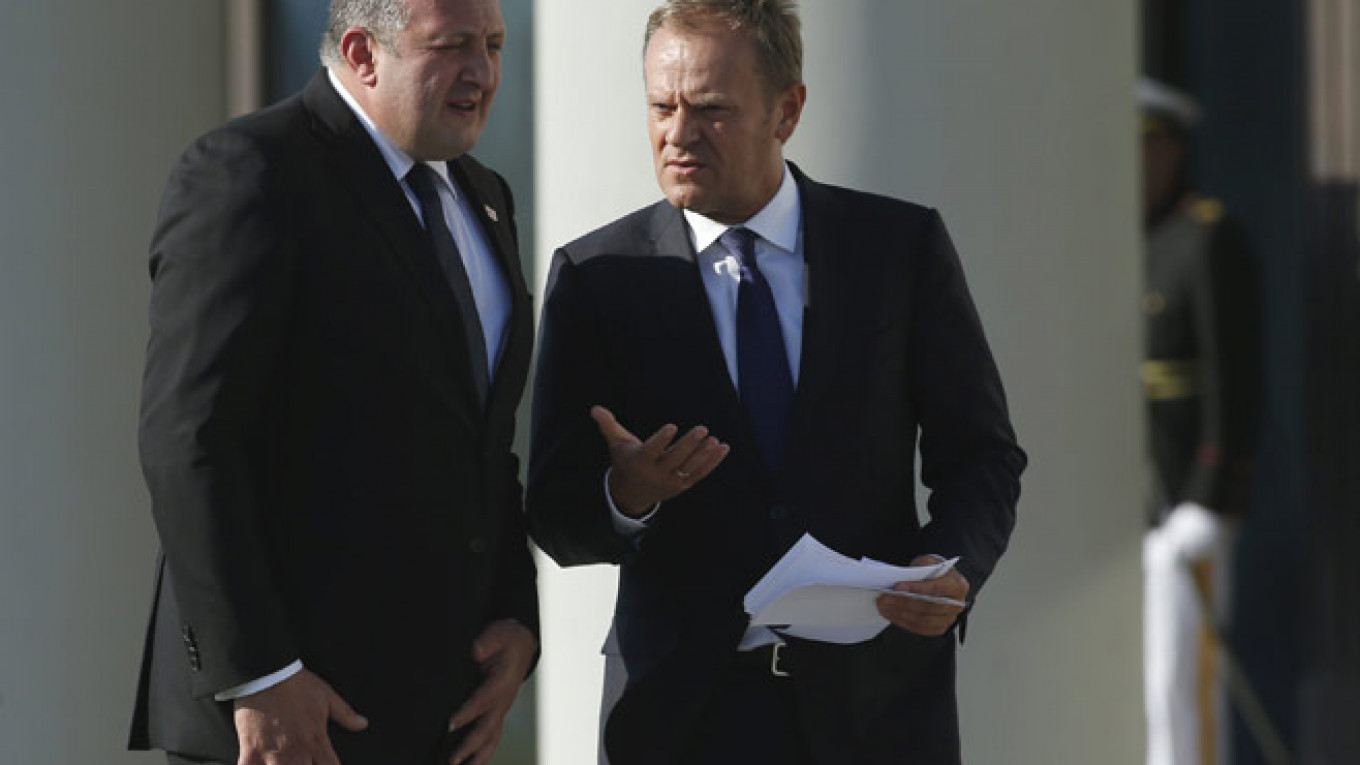Russia's advance into previously uncontested Georgian territory demonstrates that, despite its preoccupation with Ukraine, Moscow remains determined to derail Georgia's pro-Western course. This risks once more upsetting the geopolitical balance in the South Caucasus region.
Late on July 10, after a year of relative calm, Russian forces resumed their "border demarcation" activities along the South Ossetian administrative boundary, installing large signs reading "State border of the Republic of South Ossetia" about 1.5 kilometers deeper into Georgian territory than previously, just two kilometers from Georgia's major East-West Highway.
Not only did this land grab disrupt the lives of villagers, whose households ended up overnight inside Russian-controlled territory, but a kilometer-long section of the BP-operated Baku-Supsa oil pipeline now lies outside of Tbilisi's reach. With Western attention focused elsewhere, Georgia has again been left on its own to grapple with a major challenge.
The move caught the Georgian authorities by surprise. Over the last year the main focus of Moscow's actions toward Georgia had been "cooperation and security treaties" with the occupied territories of Abkhazia and South Ossetia.
But while Georgia's bids for membership of the EU and NATO are stalled, cooperation with both is ongoing. NATO's military training exercise Agile Spirit 2015 began at a military base outside Tbilisi on July 8 with the involvement of five member states, including the United States. Russia has a record of creeping annexation tactics along the South Ossetian administrative line during seminal events. There were similar occurrences during the Georgian presidential election of October 2013 and the signing of the EU Association Agreement in June 2014.
That Georgia and the EU are inching toward a visa liberalization agreement may also have contributed to Moscow's wrath. Russia believes that any progress along the path of European integration by Georgia would hinder its attempts to regain its influence. Just as in 2008, when Moscow began its invasion on the eve of the Beijing Olympics, the timing of the latest Russian provocation is skillfully chosen. Tied down with containing the Islamic State, Greece's financial woes and nuclear talks with Iran, the West has a lot on its plate.
This latest incident also coincided with the visit to Moscow of Nino Burjanadze, former parliamentary chairman and now the leader of the Democratic Movement Party. She is the most prominent pro-Russian politician in Georgia and her public criticism of the current Georgian authorities, voiced most recently during an interview with a Russian television channel, concerned Tbilisi's alleged reluctance to engage in dialogue with Russia.
Georgia has only one realistic option to counter Russian provocation: international assistance. But the West has largely been silent, not venturing beyond tired phrases of concern and counter-productiveness. In the first few days following Russia's latest actions, no major Western news network offered coverage of the occurrence.
The West may embolden Russia to make further territorial advances unless it sends a clearer message of the unacceptability of such policies and restates (consistently) the inviolability of Georgia's statehood. In the absence of such a message, Tbilisi risks succumbing to mounting Russian pressure and faces a stark choice between changing its foreign policy course in Russia's favor on the one hand and further dismemberment on the other. With Armenia already firmly within the Russian orbit through its Eurasian Economic Union membership and Azerbaijan reheating its relations with Moscow, Georgia remains the West's last serious toehold in the South Caucasus.
George Mchedlishvili was a Robert Bosch fellow at Chatham House (2013). This article was first published by Chatham House.
A Message from The Moscow Times:
Dear readers,
We are facing unprecedented challenges. Russia's Prosecutor General's Office has designated The Moscow Times as an "undesirable" organization, criminalizing our work and putting our staff at risk of prosecution. This follows our earlier unjust labeling as a "foreign agent."
These actions are direct attempts to silence independent journalism in Russia. The authorities claim our work "discredits the decisions of the Russian leadership." We see things differently: we strive to provide accurate, unbiased reporting on Russia.
We, the journalists of The Moscow Times, refuse to be silenced. But to continue our work, we need your help.
Your support, no matter how small, makes a world of difference. If you can, please support us monthly starting from just $2. It's quick to set up, and every contribution makes a significant impact.
By supporting The Moscow Times, you're defending open, independent journalism in the face of repression. Thank you for standing with us.
Remind me later.






